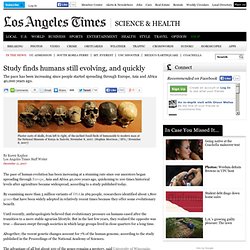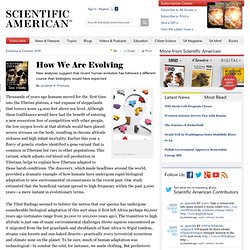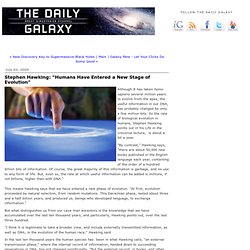

Study finds humans still evolving, and quickly. The pace of human evolution has been increasing at a stunning rate since our ancestors began spreading through Europe, Asia and Africa 40,000 years ago, quickening to 100 times historical levels after agriculture became widespread, according to a study published today.

By examining more than 3 million variants of DNA in 269 people, researchers identified about 1,800 genes that have been widely adopted in relatively recent times because they offer some evolutionary benefit. Until recently, anthropologists believed that evolutionary pressure on humans eased after the transition to a more stable agrarian lifestyle. How We Are Evolving. Thousands of years ago humans moved for the first time into the Tibetan plateau, a vast expanse of steppelands that towers some 14,000 feet above sea level.

Although these trailblazers would have had the benefit of entering a new ecosystem free of competition with other people, the low oxygen levels at that altitude would have placed severe stresses on the body, resulting in chronic altitude sickness and high infant mortality. Earlier this year a flurry of genetic studies identified a gene variant that is common in Tibetans but rare in other populations. Stephen Hawking: "Humans Have Entered a New Stage of Evolution" Although It has taken homo sapiens several million years to evolve from the apes, the useful information in our DNA, has probably changed by only a few million bits.

So the rate of biological evolution in humans, Stephen Hawking points out in his Life in the Universe lecture, is about a bit a year. "By contrast," Hawking says, "there are about 50,000 new books published in the English language each year, containing of the order of a hundred billion bits of information.
Of course, the great majority of this information is garbage, and no use to any form of life. But, even so, the rate at which useful information can be added is millions, if not billions, higher than with DNA. " This means Hawking says that we have entered a new phase of evolution. The Future of Human Evolution Website.